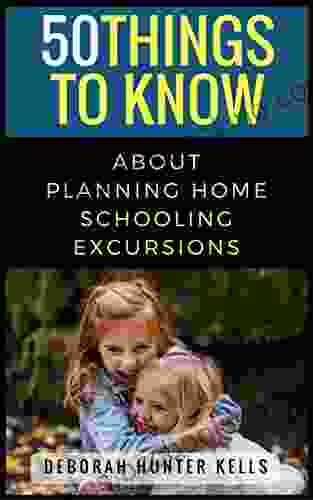50 Things To Know About Planning Home Schooling Excursions

: The Power of Hands-On Learning
Embarking on home schooling excursions can be an incredibly rewarding experience for both children and parents. These excursions offer a rich tapestry of learning opportunities that extend far beyond the confines of a classroom. They provide children with the chance to engage with the world firsthand, developing critical thinking skills, problem-solving abilities, and a deep appreciation for their surroundings.
50 Essential Considerations
To ensure your home schooling excursions are both enjoyable and educational, consider these 50 key aspects:
- Define Educational Objectives: Establish clear learning goals for each excursion to guide your planning and maximize its educational impact.
- Choose Age-Appropriate Destinations: Select destinations that align with the interests and developmental levels of your children, ensuring they are both engaged and challenged.
- Incorporate Hands-On Activities: Engage children actively by planning hands-on activities that allow them to interact with the environment and make meaningful connections.
- Research and Plan Thoroughly: Conduct thorough research to identify suitable destinations and attractions, ensuring accessibility, safety, and educational relevance.
- Visit Local Cultural Institutions: Explore museums, historical sites, and art galleries to expose children to diverse perspectives and cultivate an appreciation for culture.
- Engage with Nature: Immerse children in natural environments through hikes, nature walks, and park visits, fostering a love for the outdoors and scientific curiosity.
- Visit Businesses and Industries: Offer insights into the world of work by arranging visits to local businesses, factories, and scientific institutions.
- Connect with the Community: Engage with local organizations and community events to promote civic awareness and foster a sense of belonging.
- Plan for Flexible Learning: Allow for spontaneity and flexibility in your excursions, accommodating unexpected opportunities for learning and discovery.
- Involve Children in the Planning: Empower children by involving them in the planning process, nurturing their decision-making skills and sense of ownership.
- Consider Accessibility: Ensure all excursions are accessible to children with diverse abilities, making necessary arrangements for transportation and accommodations.
- Prioritize Safety: Always prioritize the safety of children, conducting thorough risk assessments and establishing clear safety protocols.
- Provide Opportunities for Reflection: Encourage children to reflect on their experiences through journaling, discussions, or presentations, reinforcing their learning.
- Respect the Environment: Instill environmental stewardship by practicing responsible behaviors on excursions, such as minimizing waste and respecting wildlife.
- Consider Time and Distance: Plan excursions that balance educational value with manageable travel time and distances, avoiding unnecessary fatigue.
- Look for Educational Discounts: Explore discounts and reduced admission fees offered by cultural institutions, historical sites, and other attractions.
- Utilize Online Resources: Leverage online resources, such as websites and social media groups, to discover new destinations and connect with other home schooling families.
- Pack Appropriately: Prepare for contingencies by packing essential supplies, such as snacks, water, and sunscreen, to ensure comfort and well-being.
- Consider Seasonality: Plan excursions in alignment with seasonal events and weather patterns, maximizing the educational and enjoyable aspects of the experience.
- Be Respectful of Others: Act respectfully towards fellow visitors, staff, and the surrounding community, modeling good citizenship and social responsibility.
- Foster Independent Learning: Encourage children to take ownership of their learning by asking questions, observing, and exploring at their own pace.
- Document the Experiences: Capture the memories and learning moments through photography, journaling, or other documentation methods for future reference and reflection.
- Seek Partnerships with Local Organizations: Collaborate with local organizations, such as nature centers, museums, and libraries, to enhance the educational value of excursions.
- Encourage Peer Interaction: Facilitate opportunities for children to interact with peers during excursions, fostering social development and collaboration.
- Consider Different Learning Styles: Cater to diverse learning styles by incorporating hands-on activities, visual aids, and kinesthetic experiences.
- Provide Opportunities for Creative Expression: Encourage children to express their understanding and experiences through drawing, writing, or other creative outlets.
- Make Learning Fun: Infuse excursions with elements of play and enjoyment to maintain children's engagement and motivation.
- Involve Family and Friends: Invite family members and friends to participate in excursions, enriching the experience and fostering family bonding.
- Evaluate and Revise: Regularly evaluate the effectiveness of your excursions and make adjustments as needed to optimize learning outcomes and enjoyment.
- Collaborate with Other Home Schooling Families: Join forces with other home schooling families to share ideas, plan joint excursions, and create a supportive learning community.
- Utilize Public Transportation: Explore public transportation options to broaden the range of accessible destinations and reduce transportation costs.
- Promote Physical Activity: Integrate physical activity into excursions through hiking, biking, or other outdoor activities to encourage healthy habits.
- Encourage Curiosity and Exploration: Foster a sense of curiosity and wonder in children by encouraging them to ask questions, investigate, and discover.
- Maximize Learning Opportunities: Extend the learning experience beyond the excursion by incorporating related activities, such as reading, research, or presentations.
- Encourage Responsibility: Assign children age-appropriate responsibilities during excursions, building their independence and sense of contribution.
- Promote Cultural Sensitivity: Expose children to diverse cultures and perspectives through visits to cultural festivals, ethnic restaurants, or international destinations.
- Consider Special Needs: Adapt excursions to accommodate children with special needs, ensuring they have a meaningful and enjoyable experience.
- Embrace Technology: Utilize educational apps, online resources, and GPS devices to enhance the learning and navigational aspects of excursions.
- Foster Partnerships with Schools: Explore opportunities for partnerships with local schools to access resources, participate in field trips, and enrich learning experiences.
- Build a Network of Support: Connect with other home schooling parents, educational organizations, and community groups to share knowledge, resources, and support.
- Celebrate Diversity: Celebrate the diversity of perspectives and experiences that excursions bring by encouraging children to share their thoughts and ideas.
- Promote Personal Growth: Use excursions as opportunities for personal growth, empowering children to step outside their comfort zones and develop resilience.
- Encourage Critical Thinking: Challenge children to think critically about what they see and experience, developing their analytical and problem-solving skills.
- Develop Communication Skills: Encourage children to communicate their observations, ask questions, and share their knowledge during excursions.
- Foster a Love for Learning: Instill in children a lifelong love for learning by exposing them to the diverse and engaging experiences that excursions offer.
- Balance Structure and Flexibility: Establish a balance between structured learning activities and opportunities for unstructured exploration and discovery.
- Seek Feedback from Children: Regularly seek feedback from children to assess their engagement, comprehension, and enjoyment, and adjust your planning accordingly.
- Use Technology Responsibly: While technology can be a valuable tool, encourage children to disconnect and engage with the world around them during excursions.
- Create a Positive and Welcoming Atmosphere: Foster a positive and welcoming atmosphere during excursions by being supportive, encouraging, and respectful of all participants.
- Enjoy the Journey: Remember that the most important aspect of home schooling excursions is the journey itself. Embrace the learning moments, enjoy the experiences, and create lasting memories with your children.
: The Transformative Power of Excursions
Incorporating excursions into your home schooling curriculum can profoundly transform your children's educational journey. These excursions provide a tangible link between classroom learning and the real world, allowing children to explore their interests, develop essential skills, and foster a lifelong love for learning.
4.6 out of 5
| Language | : | English |
| File size | : | 1293 KB |
| Text-to-Speech | : | Enabled |
| Screen Reader | : | Supported |
| Enhanced typesetting | : | Enabled |
| Word Wise | : | Enabled |
| Print length | : | 33 pages |
| Lending | : | Enabled |
By embracing these 50 essential considerations, you can create home schooling excursions that are engaging, educational, and truly unforgettable. Empower your children to embark on a journey of discovery, exploration, and personal growth that will shape their future in remarkable ways.
4.6 out of 5
| Language | : | English |
| File size | : | 1293 KB |
| Text-to-Speech | : | Enabled |
| Screen Reader | : | Supported |
| Enhanced typesetting | : | Enabled |
| Word Wise | : | Enabled |
| Print length | : | 33 pages |
| Lending | : | Enabled |
Do you want to contribute by writing guest posts on this blog?
Please contact us and send us a resume of previous articles that you have written.
 Book
Book Novel
Novel Page
Page Chapter
Chapter Text
Text Story
Story Genre
Genre Reader
Reader Library
Library Paperback
Paperback E-book
E-book Magazine
Magazine Newspaper
Newspaper Paragraph
Paragraph Sentence
Sentence Bookmark
Bookmark Shelf
Shelf Glossary
Glossary Bibliography
Bibliography Foreword
Foreword Preface
Preface Synopsis
Synopsis Annotation
Annotation Footnote
Footnote Manuscript
Manuscript Scroll
Scroll Codex
Codex Tome
Tome Bestseller
Bestseller Classics
Classics Library card
Library card Narrative
Narrative Biography
Biography Autobiography
Autobiography Memoir
Memoir Reference
Reference Encyclopedia
Encyclopedia Dean Scaduto
Dean Scaduto Deborah Grace White
Deborah Grace White David H Barlow
David H Barlow David G Kingdon
David G Kingdon David J Bland
David J Bland David L Demets
David L Demets David Alloway
David Alloway David M Oshinsky
David M Oshinsky David N Myers
David N Myers David Throop
David Throop David James Smith
David James Smith David Weston Marshall
David Weston Marshall David W Cameron
David W Cameron Daniele Bolelli
Daniele Bolelli Debby Waldman
Debby Waldman Darrell Gartrell
Darrell Gartrell David Rowlands
David Rowlands Daryl Ashby
Daryl Ashby Dave Whitlock
Dave Whitlock Danya Ruttenberg
Danya Ruttenberg
Light bulbAdvertise smarter! Our strategic ad space ensures maximum exposure. Reserve your spot today!

 Ryūnosuke AkutagawaPractical Font Design With Fontlab: Unleash Your Typographic Creativity
Ryūnosuke AkutagawaPractical Font Design With Fontlab: Unleash Your Typographic Creativity
 Terry PratchettDiscover the Enchanting World of Penguins with David Salomon's Step Into...
Terry PratchettDiscover the Enchanting World of Penguins with David Salomon's Step Into... Gordon CoxFollow ·4.4k
Gordon CoxFollow ·4.4k Graham BlairFollow ·17.5k
Graham BlairFollow ·17.5k T.S. EliotFollow ·2.6k
T.S. EliotFollow ·2.6k J.D. SalingerFollow ·12.3k
J.D. SalingerFollow ·12.3k Houston PowellFollow ·16.1k
Houston PowellFollow ·16.1k Tom HayesFollow ·6.3k
Tom HayesFollow ·6.3k Brandon CoxFollow ·17.7k
Brandon CoxFollow ·17.7k Colin FosterFollow ·13.9k
Colin FosterFollow ·13.9k

 Cameron Reed
Cameron ReedHow to Know When Language Deceives You
Unmasking the Power of...

 Robbie Carter
Robbie Carter50 Things To Know About Planning Home Schooling...
: The Power of Hands-On Learning Embarking...

 Julio Cortázar
Julio CortázarCalculus: Single and Multivariable, 8th Edition — The...
Calculus is the...

 Jaime Mitchell
Jaime MitchellBunnicula and Friends: A Spooktacular Tale of Mystery and...
In the quaint little town of Celeryville,...

 Josh Carter
Josh CarterPeppa Easter Egg Hunt: Join Peppa Pig on an...
Get ready for...

 Donovan Carter
Donovan CarterBoy Called Dickens: A Journey into the Childhood of a...
Delving into the...
4.6 out of 5
| Language | : | English |
| File size | : | 1293 KB |
| Text-to-Speech | : | Enabled |
| Screen Reader | : | Supported |
| Enhanced typesetting | : | Enabled |
| Word Wise | : | Enabled |
| Print length | : | 33 pages |
| Lending | : | Enabled |







